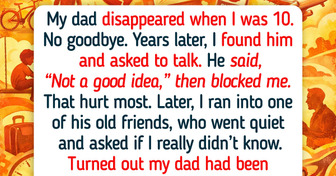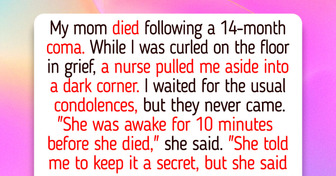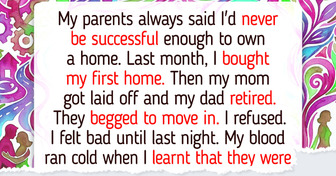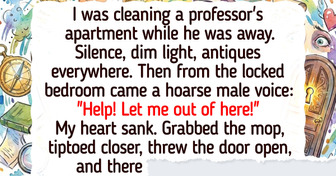I Refused to Give My Inheritance to My Kids—They Plotted Against Me
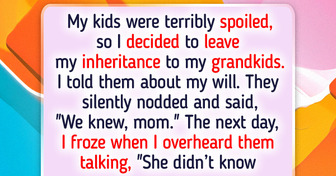
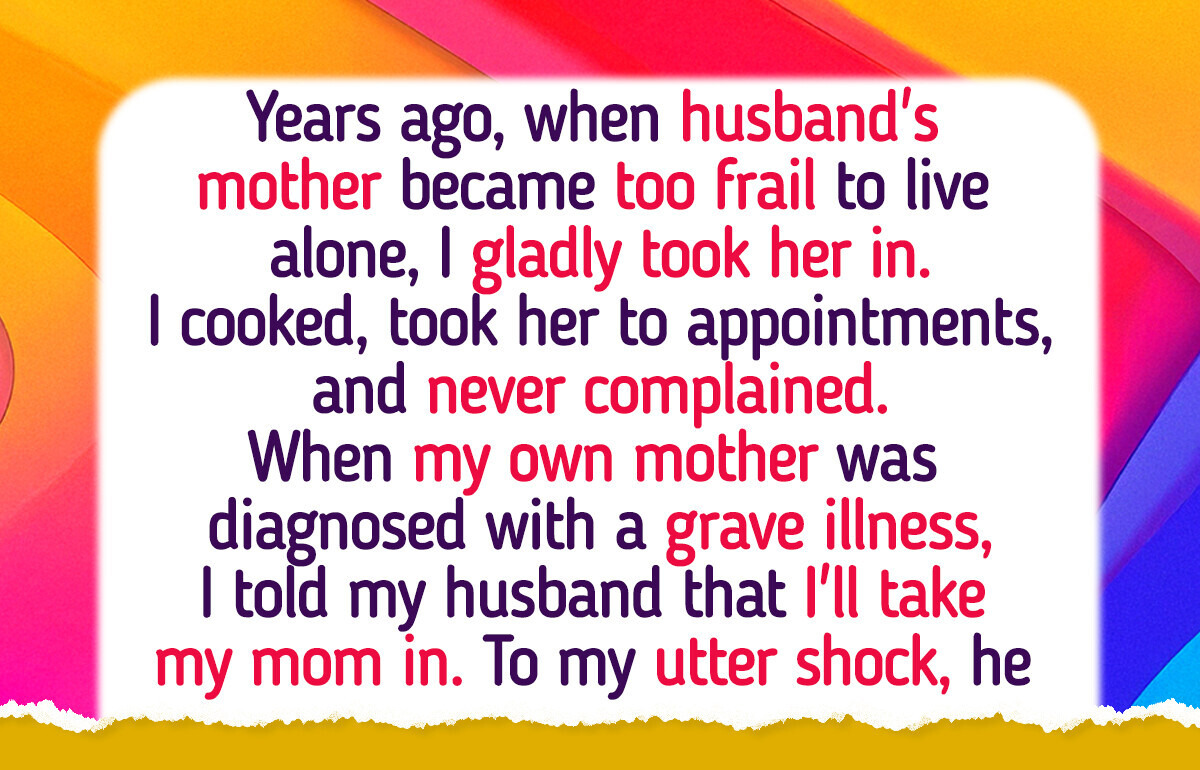
Sarah, 39, wrote to the Bright Side editorial team with a story that strikes at the heart of love, loyalty, and betrayal. For years, she cared selflessly for her husband’s ailing mother—cooking for her, driving her to appointments, even giving up her own space to ensure the woman’s comfort.
So when Sarah’s own mother fell seriously ill, she expected the same support in return. Instead, her husband coldly suggested a nursing home. The ultimatum stunned her—but Sarah didn’t back down. Furious and heartbroken, she decided to teach her arrogant husband a lesson he would never forget.
Sarah wrote, "My husband and I don’t have kids. We own a big house and there’s room for everyone. My MIL lives with us and I’m fine with that. Recently, my mom was diagnosed with a grave illness and I suggested she move in with us. To my utter shock, my husband went so furious and said, “Don’t you dare even think about it! I don’t want this burden on my shoulders!”
The woman shared, “My husband is 45, I’m 39, and we’ve been married for 12 years. We never had children, and maybe that’s why our house always felt too big, too quiet. My husband, Mark, and I have more than enough space—five bedrooms, a lush backyard, a sunroom I’d turned into a reading nook, and still room to spare.”
The woman wrote, “Years ago, when husband’s mother became too frail to live alone, I gladly took her in. I cooked, took her to appointments, and never complained. When my own mother was diagnosed with a gravely illness, I told my husband that I’ll take my mom in. To my utter shock, he coldly refused and suggested that I should put her in a nursing home instead.”
Sarah confessed, “I did not expect this cruelty and selfishness from Mark. I thought I knew him, and when my mom got ill, I naturally thought she’d come live with us, too. I expected the conversation with Mark to be practical, maybe even tender. What I got instead left me shattered.
‘A nursing home would be more suitable for someone in her condition,’ he said, without even looking up from his tablet.”
The woman wrote, “I laughed, thinking it was a cruel joke. ‘Are you serious? You think I should just dump her in a facility while your mother sleeps down the hall?’
Mark lowered the tablet. His expression was cold, distant. ‘Margaret is my responsibility. Your mother... well, she’s yours.’
It felt like the floor fell out beneath me. ‘She’s dying, Mark. She has months. Maybe weeks.’
‘And you want to spend those months turning our home into a hospice?’ he shot back. ‘Think, Sarah. She’ll need full-time care, machines, nurses—what will that do to our lives?’
Our lives. The words stung. Suddenly I realized his our didn’t include me when things got hard.
He saw my silence as consent. He arranged a visit to a nearby care facility—nice, clean, clinical. My mother looked around quietly, then held my hand and said, ‘If this is where you need me to be, honey, I understand.’
I went home and cried so hard I vomited. I wasn’t angry yet. Just broken.”
Sarah shared, "But over time, something in me shifted. Watching Margaret eat the meals I cooked, laugh at the shows I queued up for her, I began to seethe. How is this fair? I thought. My mother, my rock, was wasting away alone, while his mother was pampered like royalty.
Still, I played the role. The doting wife. The patient daughter-in-law.
Until karma arrived.
It was a Tuesday when Mark collapsed in the kitchen, clutching his side. Appendicitis, they said at first. Then complications. Then a longer recovery. He would need weeks of at-home care, limited mobility, assistance with hygiene and meals. The irony was cruel.
He came home, pale and exhausted. Margaret asked if we’d set up a room for him. I looked at him and felt the sting of what he had done to my mother.
“No,” I said. “I booked him a room at a hotel near the hospital. There’s a shuttle that comes twice a day. They have nurses on-call.”
He stared at me like I’d lost my mind. “You’re sending me to a hotel? Sarah, I just had surgery!”
“Oh, I know,” I said sweetly. “But I figured you wouldn’t want to turn our home into a recovery ward. What would that do to our lives?”
Margaret gasped. Mark tried to argue, but I handed him the hotel brochure and said, “Don’t worry. If it’s good enough for my dying mother, it’s good enough for you.”
He left. I watched from the porch, arms folded, as he limped toward the car. Alone.
That night, I called my mom and said, “Pack your things. You’re coming home.”
She cried. I cried. Even Margaret cried.
Over the next few weeks, the house was filled with warmth and purpose. Mom’s smile returned, faint but real. Margaret began sitting by her bed, knitting, talking to her gently. Even she saw what Mark never could—what love truly looks like.
Mark returned after two weeks, humbled, quiet. He never said he was sorry, not directly. But he looked at me differently. As if realizing, maybe for the first time, that I was not someone to cast aside when things got inconvenient.
And I never let him forget. Every cold night, every lonely meal, every call he made to beg for help—I let it all sit in his soul like a stone.
Because sometimes, the only way to teach someone empathy is to let them taste the very medicine they prescribed for others.
And oh, did it taste bitter."
You may also like: I Refuse to Give Up My Dream to Save My Granddaughter, She Has Her Parents






